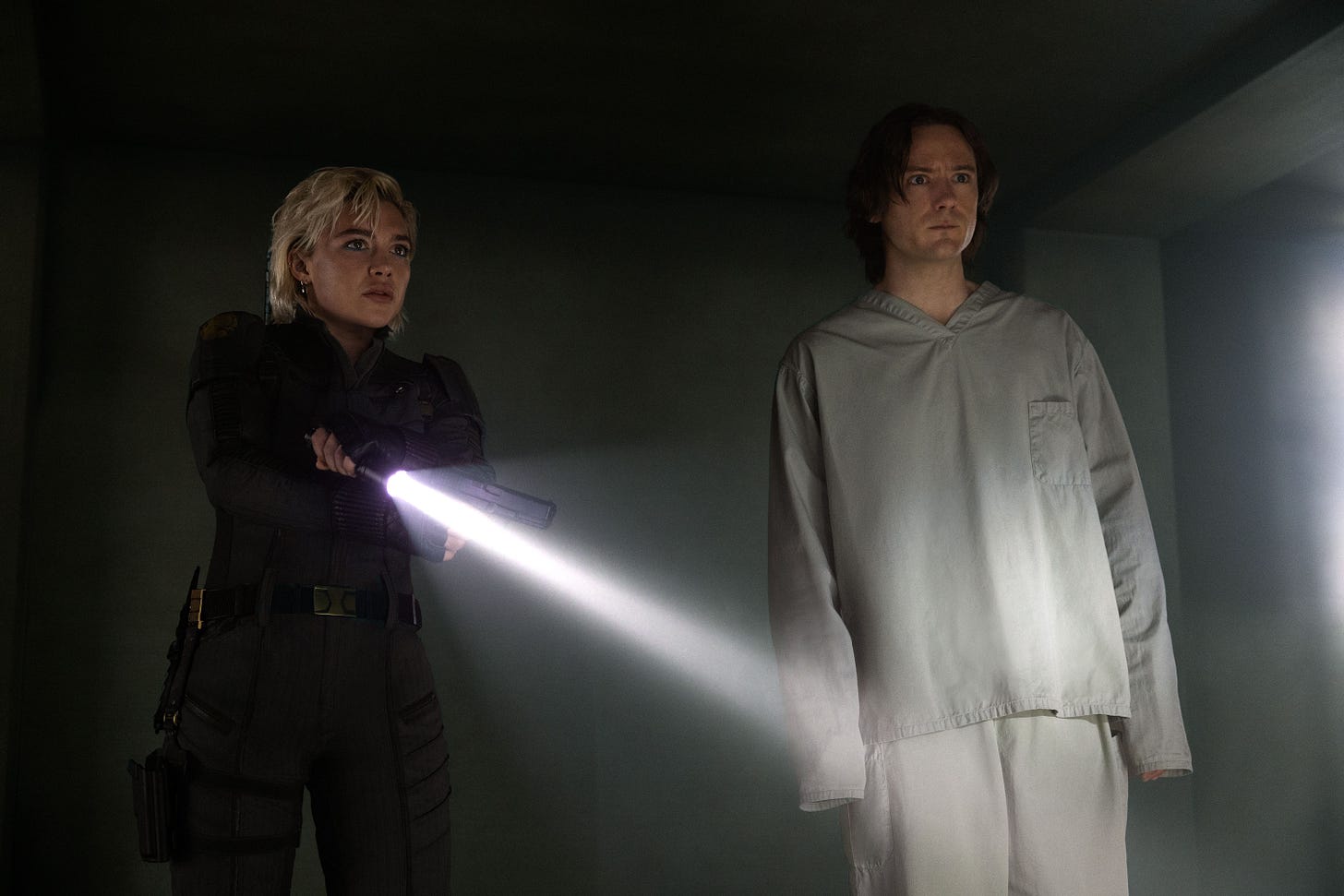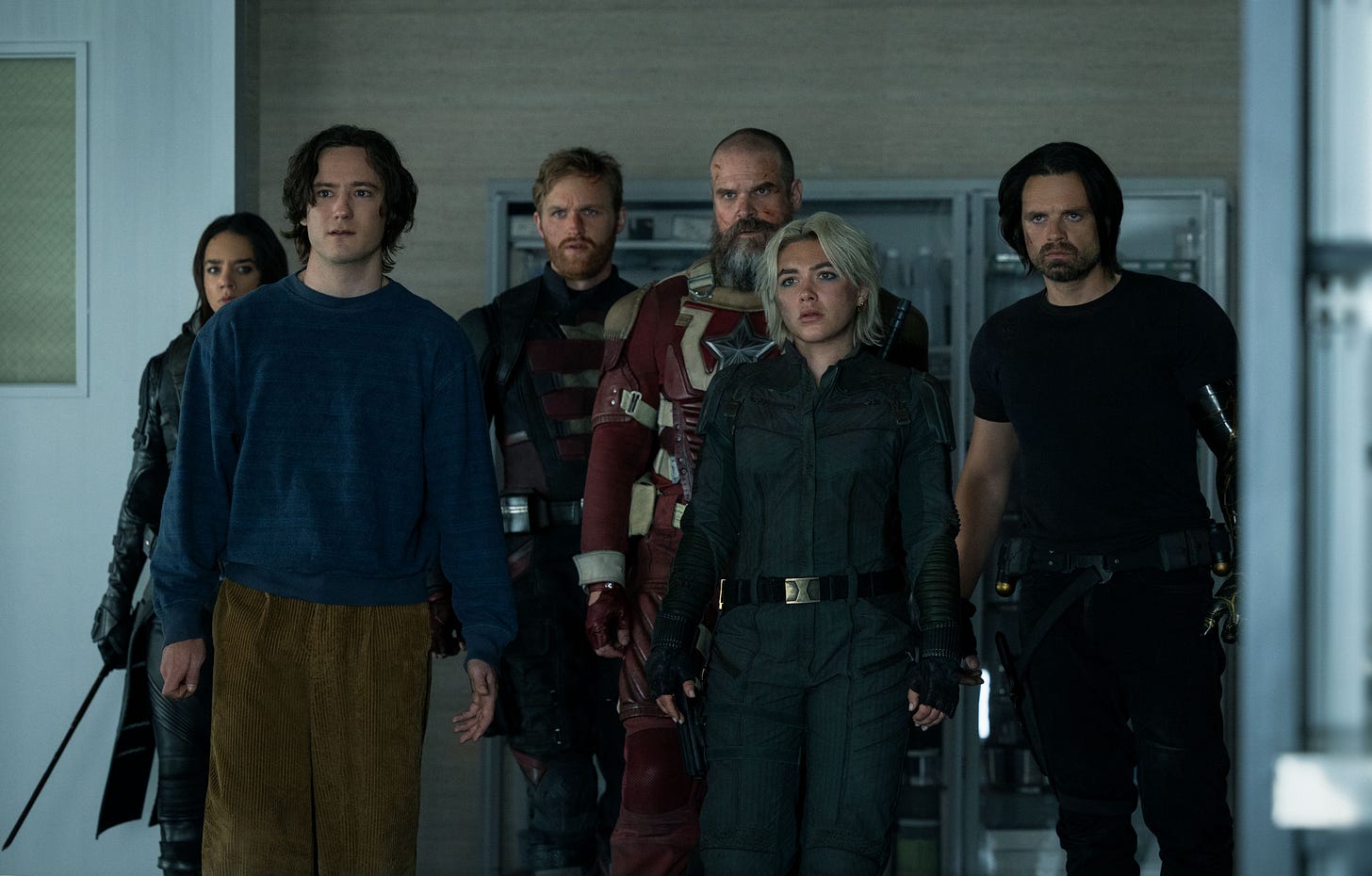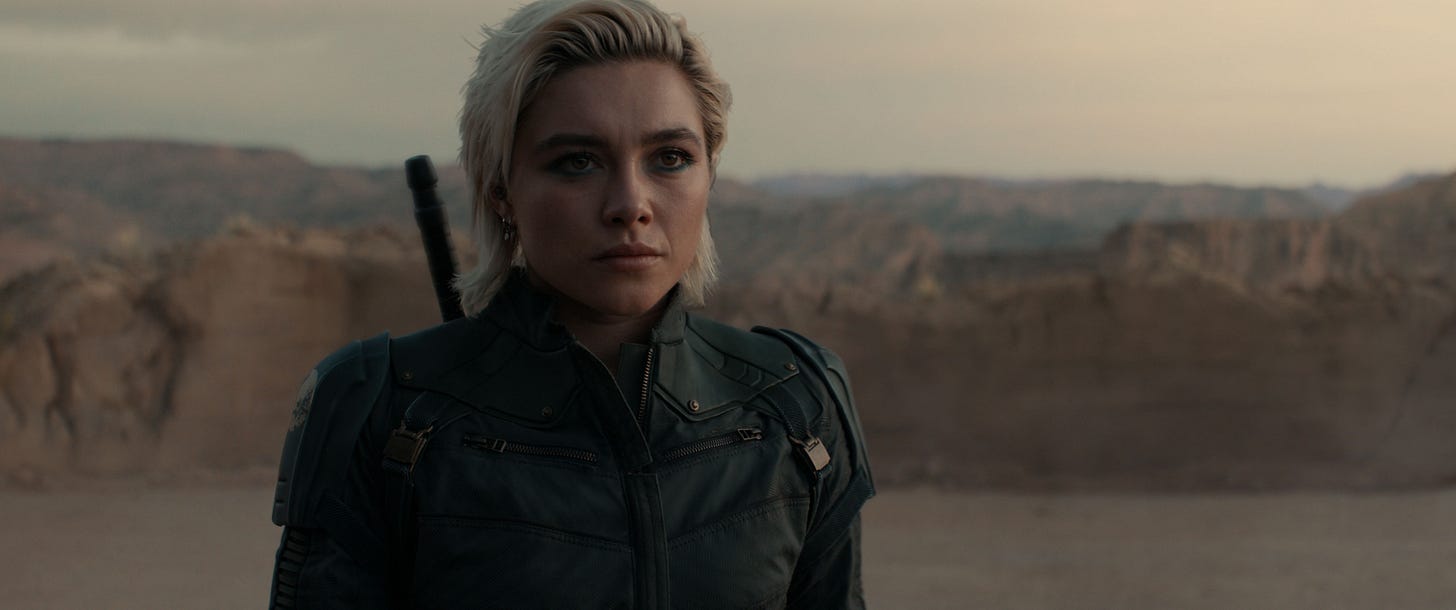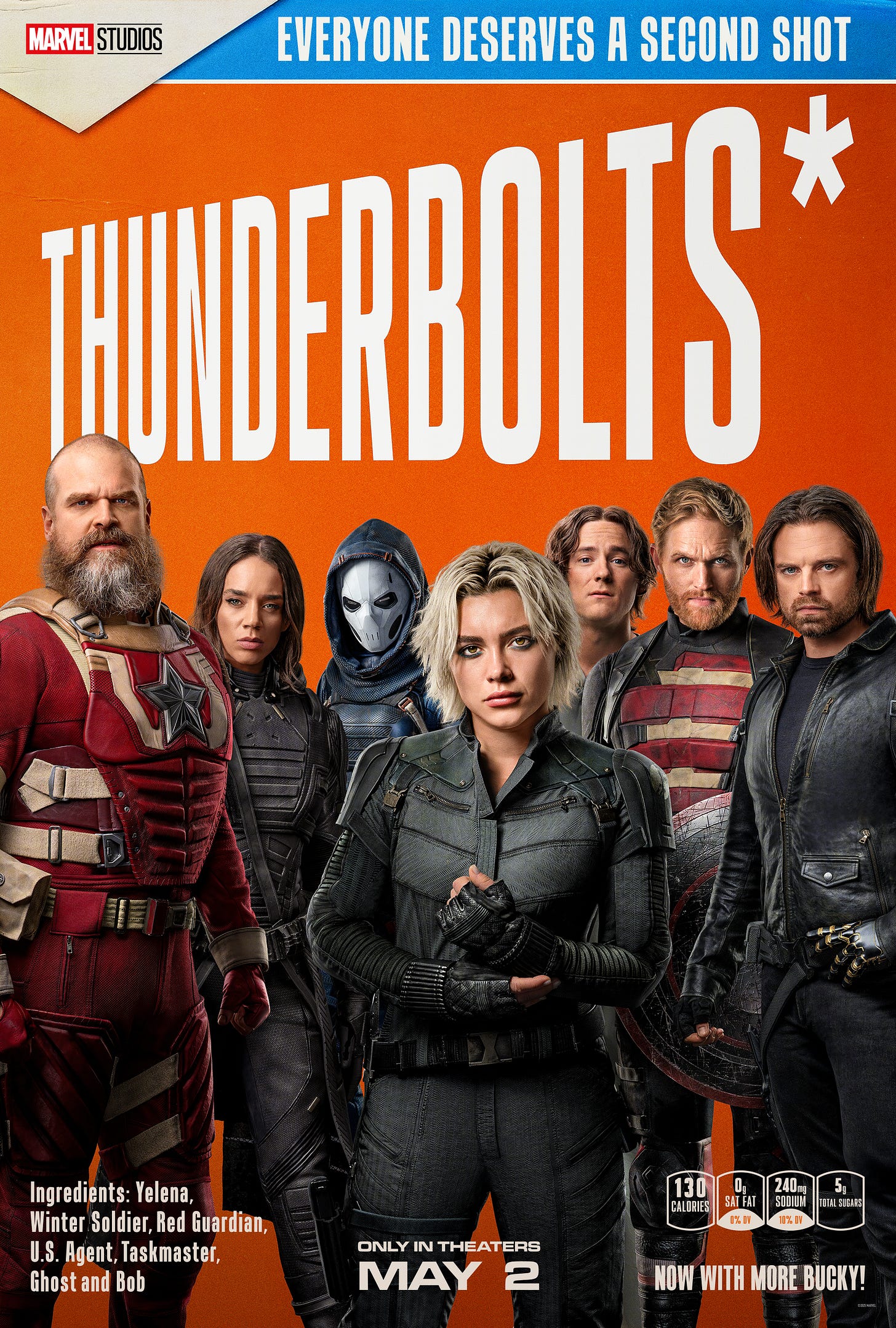Thunderbolts* Review: Hugs, Not Drugs
It's not quite a comeback, but the latest Marvel movie has a heart
Thunderbolts* probably isn't the Marvel Cinematic Universe game-changer some rapturous premiere-goers have declared it to be, but it is at least about something with emotional resonance. That's pretty important since, like Captain America 4 before it, Marvel has already spoiled most of the movie's surprises through marketing, casting announcements, and merchandising. Relying on big shocking surprises has always been a bit of a crutch – it works once, but if you want rewatchability, there had better be more. Here there is more, and it's not just the obvious “misfits can make a found family if they don't have one of their own” theme that Helen Keller could have seen coming.
But let's back up a bit before diving into thematics. Thunderbolts* brings together supporting characters from Black Widow and the Captain America sub-franchise, along with Ghost – a leftover villain from Ant-Man and the Wasp -- and a newcomer simply named Bob (Lewis Pullman). They've all basically been treated like loose ends, which they literally are storywise. Most are individually working for Julia Louis-Dreyfus' Allegra Valentina de Fontaine, whose resemblance to Tulsi Gabbard now seems extra-satirical, though timing wise it's almost certainly accidental. Like Ms. Gabbard, she's terrible at handling intelligence and should be impeached – since this is a fantasy, de Fontaine actually is being impeached when we see her again. So her loose ends have to be not just tied up, but erased entirely, which leads her to send Taskmaster (Olga Kurylenko), Ghost (Hannah John-Kamen), Yelena Belova (Florence Pugh), and US Agent (Wyatt Russell) all on separate missions to the same government vault to kill one another. While there they randomly encounter Bob, a guy in pajamas who has no idea how or why he got there, but he has a certain lost-dog charm that's enough for Yelena to want to protect him.

The entire first act of the movie basically plays out like an escape room; no doubt an official version for fans to play in is coming soon. As deadly escape rooms go, its threats aren't especially interesting, and mostly serve as backdrop so that our main characters can catch us up on their lives, and so that we can learn more about Bob. In a surprising level of story permission from the same Disney that wouldn't let Tony Stark be an alcoholic, it turns out Bob is a former meth addict, and an extreme manic depressive. Considering that Yelena is in the emotional numbness phase of grieving her dead sister Natasha, they bond over their failed attempts at emotional suppression.
It wouldn't be much of a movie if they stayed in the vault the whole time, so I trust it's no great spoiler to say they get out, at which point Red Guardian (David Harbor) and newly elected congressman Bucky (Sebastian Stan) become involved. Threatened by the fact that her super-operatives are still alive, Valentina ups the stakes, with the aid of one secret that hasn't yet been destroyed. (Comics fans have already deduced it a while back, but I'll say no more.)

I'm a pretty easy mark for MCU movies; Geekerati readers will surely remember I was more positive than most towards Captain America 4. There were times in Thunderbolts*, however, that I really feared the movie was going to lose the plot completely. During the first half of the movie or so, some of the comedic banter felt really forced. It works when it's rooted in character, like having Red Guardian be the ultimate embarrassing dad on steroids. But after a vehicle crashes, and Yelena quips that she's going to call an Uber, that just seems like a cheap laugh – we know she's not going to call an Uber where they are, and she's not the kind of character to make a joke about it, so why say it, except that a screenwriter thought it was funny? [Ed. Note from Christian— I’d like Whedonisms like this to fade into the Dustbin of History.] It reminded me of the joke near the end of Small Soldiers where characters on a boat make a joke about hitting an iceberg – there's no logical way they would do that in their situation, but Titanic was a recent hit movie, so Hollywood studio logic is that iceberg reference = funny, even though the characters in question are talking action figures who would not have seen Titanic.
That's a wordy explanation of the kind of movie joke that gets a cheap laugh but I find takes me out of the story, but there it is. As Thunderbolts* progresses, though, it goes to some dark places. Well, dark for a franchise movie product, anyway – we're not talking Marvel's Requiem for a Dream, but we're not far from Marvel's ParaNorman, shall we say. The jokes give way to sadness, and we realize that tonal shift is the point, putting us in a bipolar mood like Bob. (Note: I do not consider this movie a serious, realistic analysis of manic depression, and nor should you, but it gets within the same kind of spitting distance allegory as any mass-audience comic might dare.)
The second place I thought the movie might go off track was when a plotline seemed to be headed for the same old “What if Superman, but evil?” that we've seen many times now in shows like The Boys and movies like Brightburn. It goes a different direction, though, and one that mirrors the themes discussed so far. For viewers who have struggled with depression or addiction, or had loved ones who did, it may strike a nerve or heartstring. Director Jake Schreier made his feature debut with Robot and Frank, another sci-fi movie with heartbreaking twists, so he's good at this stuff. He also seems to have a comic-book sensibility – the movie's opening, with Yelena giving comic-panel-style voice over as her fights are seen from overhead angles, feels very much like comic panels, and like for the first time in a while, we're in the hands of a skilled director who gets it.

For years, the stereotypical comics fan was depicted as a lonely single male, a stereotype not untrue in my own life experiences. All too often, such people can become bitter, and their fandom weaponized by insincere political players, and we get the popular perception of the “incel,” a misogynist fan whose entitlement is toxic – these have been represented in fictional villainy by the likes of Rowan in Paul Feig's Ghostbusters, or Kylo Ren in The Force Awakens. What Thunderbolts* gets is that toxic fans aren't just evils that spring from nowhere – they are sometimes lonely people deliberately being used as destructive pawns in a culture war, to empower the worst puppet masters of all. And wouldn't it be better if instead, the lonely, sad people empowered each other instead? Florence Pugh, her eyes underlined in blue like cartoon tears are about to well up, carries depression and open sadness in her many closeups – she may be embarrassed by super-dork dad, but she needs him too. Pullman is the movie's MVP, both displaying and suppressing Bob's many moods, and moments of blackout amnesia.
Yes, the asterisk in Thunderbolts* is explained, but only at the very end of the movie. What I can say is that in this continuity, the name has nothing to do with Thunderbolt Ross, the Hulk president from the last movie. It does have everything to do with how the movie ends. But then, it doesn't really end-end: this is a story that knows the battle with sadness is ongoing, and awkward, and can lead to some strange places.
[Editor’s Note from Christian — For me one of the most impressive things about this film is that Florence Pugh fought to do her own stunt in a key scene and the studio eventually caved and let her. Given Luke’s discussion of how the film engages with depression, it adds a new subtle note to this scene and makes me even more eager to see the film.]





The funny thing about that stunt is after all that, they don't exactly shoot it Tom Cruise/Chris McQuarrie style. It could easily not be her, since we mostly see it at a distance with her a pure silhouette
Great article! I just posted my Thunderbolts* review too, in case you want to check it out ;)